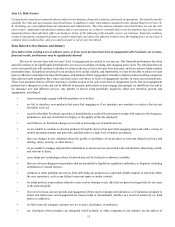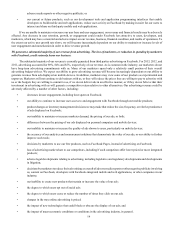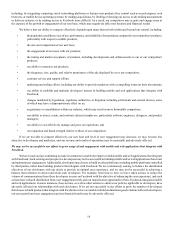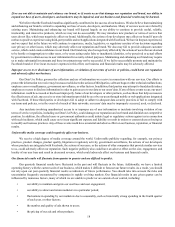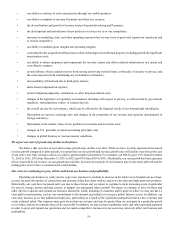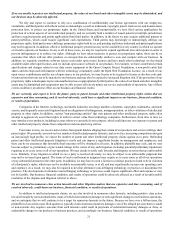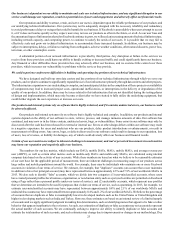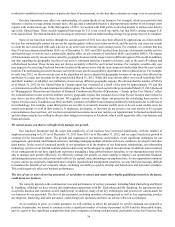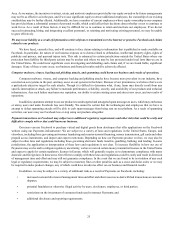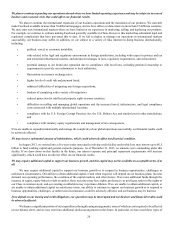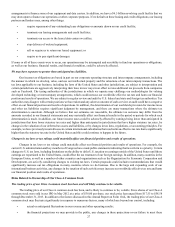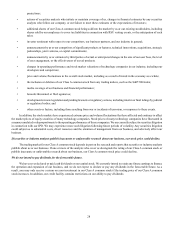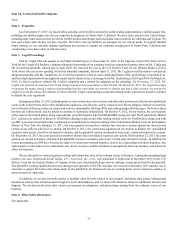Facebook 2013 Annual Report Download - page 24
Download and view the complete annual report
Please find page 24 of the 2013 Facebook annual report below. You can navigate through the pages in the report by either clicking on the pages listed below, or by using the keyword search tool below to find specific information within the annual report.22
could be materially and adversely affected. Although the results of such lawsuits and claims cannot be predicted with certainty, we
do not believe that the final outcome of those matters relating to our products that we currently face will have a material adverse effect
on our business, financial condition, or results of operations. In addition, we are currently the subject of stockholder class action suits
in connection with our IPO. We believe these lawsuits are without merit and are vigorously defending these lawsuits.
There can be no assurances that a favorable final outcome will be obtained in all our cases, and defending any lawsuit is costly
and can impose a significant burden on management and employees. Any litigation to which we are a party may result in an onerous
or unfavorable judgment that may not be reversed upon appeal or in payments of substantial monetary damages or fines, or we may
decide to settle lawsuits on similarly unfavorable terms, which could adversely affect our business, financial conditions, or results of
operations.
Our CEO has control over key decision making as a result of his control of a majority of our voting stock.
Mark Zuckerberg, our founder, Chairman, and CEO, is able to exercise voting rights with respect to a majority of the voting
power of our outstanding capital stock and therefore has the ability to control the outcome of matters submitted to our stockholders
for approval, including the election of directors and any merger, consolidation, or sale of all or substantially all of our assets. This
concentrated control could delay, defer, or prevent a change of control, merger, consolidation, or sale of all or substantially all of our
assets that our other stockholders support, or conversely this concentrated control could result in the consummation of such a transaction
that our other stockholders do not support. This concentrated control could also discourage a potential investor from acquiring our
Class A common stock due to the limited voting power of such stock relative to the Class B common stock and might harm the trading
price of our Class A common stock. In addition, Mr. Zuckerberg has the ability to control the management and major strategic
investments of our company as a result of his position as our CEO and his ability to control the election or replacement of our directors.
In the event of his death, the shares of our capital stock that Mr. Zuckerberg owns will be transferred to the persons or entities that he
designates. As a board member and officer, Mr. Zuckerberg owes a fiduciary duty to our stockholders and must act in good faith in a
manner he reasonably believes to be in the best interests of our stockholders. As a stockholder, even a controlling stockholder,
Mr. Zuckerberg is entitled to vote his shares, and shares over which he has voting control as a result of voting agreements, in his own
interests, which may not always be in the interests of our stockholders generally.
We plan to continue to make acquisitions, which could require significant management attention, disrupt our business, result in
dilution to our stockholders, and adversely affect our financial results.
As part of our business strategy, we have made and intend to make acquisitions to add specialized employees, complementary
companies, products, or technologies. Our ability to acquire and integrate larger or more complex companies, products, or technologies
in a successful manner is unproven. In the future, we may not be able to find other suitable acquisition candidates, and we may not
be able to complete acquisitions on favorable terms, if at all. Any future acquisitions we complete could be viewed negatively by
users, developers, marketers, or investors, and our acquisitions may not achieve our goals. For example, in August 2012, we acquired
Instagram and since the acquisition, we have been focused on user growth and the users' experience. We just recently began showing
ads on Instagram in the United States and we cannot assure you that these ads will generate meaningful revenue for our business. In
addition, if we fail to successfully close or integrate any acquisitions, integrate the products or technologies associated with such
acquisitions into our company, or identify and address liabilities associated with the acquired business or assets, our business, revenue,
and operating results could be adversely affected. Any integration process may require significant time and resources, and we may
not be able to manage the process successfully. We may not successfully evaluate or utilize the acquired products, technology, or
personnel, or accurately forecast the financial impact of an acquisition transaction, including accounting charges. In addition, our
ability to conduct due diligence with respect to acquisitions, and our ability to evaluate the results of such due diligence, is dependent
upon the accuracy and completeness of statements and disclosures made or actions taken by the companies we acquire or their
representatives. Despite our efforts, there could be significant liabilities or deficiencies associated with the business, assets, products,
financial condition or accounting practices related to the assets or companies we acquire. In addition, we may have to pay cash or
incur debt to pay for acquisitions, which could adversely affect our financial results and liquidity. Additionally, we may issue equity
securities to pay for acquisitions or to retain the employees of the acquired company, which could increase our expenses, adversely
affect our financial results and result in dilution to our stockholders. The incurrence of indebtedness would result in increased fixed
obligations and could also include covenants or other restrictions that would impede our ability to manage our operations.



